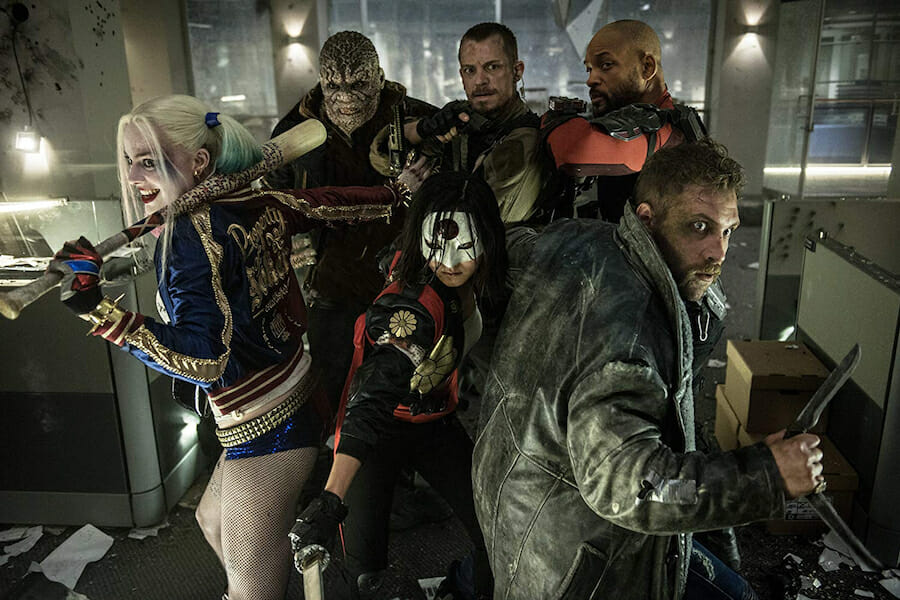
‘Suicide Squad’: Proof that the Superhero Movie is Invincible
Defying some particularly harsh reviews, Suicide Squad is killing it. This latest cinematic comic book adaptation has managed to rake in an impressive $267 million worldwide in only three days and is currently top of the UK box office. David Ayer’s film – about a motley crew of supervillains strong-armed into saving the world from an even worse supervillain – is proof that the superhero genre’s popularity shows no signs of diminishing yet.
Cinema’s current superhero renaissance is well into its second decade, Hollywood having been alerted to the lucrative potential of the genre in its contemporary form by the success of Bryan Singer’s X-Men in 2000. From a studio’s point of view, the superhero film currently appears to be the closest thing to that ever-elusive holy grail of the guaranteed box office hit.
Commercially speaking, these films satisfy all the requirements of a blockbuster. They are based on essentially simple core narratives which feature iconic heroes and villains, provide numerous opportunities to showcase spectacular visual effects and action set pieces, do not necessarily require expensive stars to attract audiences, and naturally lend themselves to multiple merchandising opportunities. And protagonists such as Superman, Batman and Spider-Man bring with them that all-important pre-existing audience awareness which films based on new material lack. The value of this to an industry in which film studios are becoming more conservative and less willing to digress from identifiable brands is obvious.

But perhaps one of the most attractive features for studios is that these characters have often evolved over decades of comic book source material, meaning that they have an unparalleled potential to be mined for unending sequels and spin-offs. Since 2000, Twentieth Century Fox alone has released six X-Men films – plus two Wolverine spin-offs with a third on the way. Warner Bros. has made six Batman/Superman films (including Suicide Squad), starting with Christopher Nolan’s retelling of the Batman myth, the Dark Knight trilogy. Marvel has granted Captain America, Iron Man and Thor a trilogy each.
Fictional universes
In the last decade, the superhero genre has taken the concept of the sequel to a whole new level. Marvel Studios in particular has broken new industry ground in this respect. They ambitiously aim to replicate the interconnected narrative network of their comic books onscreen. They do so by creating a carefully structured web of films in which characters such as Captain America, Hulk and Thor appear not only in their own and each other’s films but also unite in phenomenally successful superhero team-ups such as The Avengers (2012) and Avengers: Age of Ultron (2015).
Now, the Warner Bros. owned DC Entertainment – who produced Suicide Squad – is playing catch-up with its rival Marvel Studios. Initially concentrating on Nolan’s self-contained “real world” Dark Knight trilogy, Warner Bros. had to wait until relatively recently to launch its current wider cinematic universe. Suicide Squad is the third film in this new universe following Zack Snyder’s reinventions of Superman and Batman in Man of Steel (2013) and its sequel Batman v Superman (2016).
Yet the superhero film must inevitably reinvent itself if it is to retain interest. With the more straightforward narrative model of superhero versus supervillain having been exhausted, the genre has entered a new phase of self-cannibalisation in which the archetypal good versus evil narrative structure has been (necessarily) warped.
In 2016, superheroes have not just turned on one another – with Captain America battling his former Avengers teammate Iron Man in Civil War – they have also turned on the very genre itself, as seen in Deadpool. Warner Bros.’s latest offerings reflect this trend, dispensing with the idea of the admirable superhero. Batman v Superman positions its two eponymous protagonists as enemies rather than allies. Suicide Squad goes further, dispensing with superheroes altogether by requiring the titular team of villains to be the “good guys.”
Superhero futures
So, where next for the superhero film? Phenomenal box office returns for Captain America: Civil War and Deadpool have ensured that Hollywood’s enthusiasm for caped saviours will not be waning anytime soon, something which is evidenced by both Marvel and DC’s release plans for the foreseeable future. After all, audiences are still eager to see films such as Batman v Superman and Suicide Squad even though many reviewers are warning them to stay away. Like Superman himself, superhero films seem to be – for the time being – bulletproof.
There are signs that the next evolutionary stage of the superhero genre is one which is likely to be defined by the issue of diversity. While Marvel does have a number of black and female superheroes, all of its films’ lead characters thus far have been white males. The studio’s recent announcement that it is to make Black Panther, with black actors in all of its lead roles, and that Oscar winner Brie Larson is to play the titular role in Captain Marvel, the studio’s first female led film, suggests that the industry is beginning to redress this balance.
But for now, it is DC who appears to be leading the way in this respect with the release of Wonder Woman next year and the notably more diverse cast of Suicide Squad. Happily, the superhero genre looks to be defined by new kinds of heroes.
This article was originally published on The Conversation. Read the original article.
